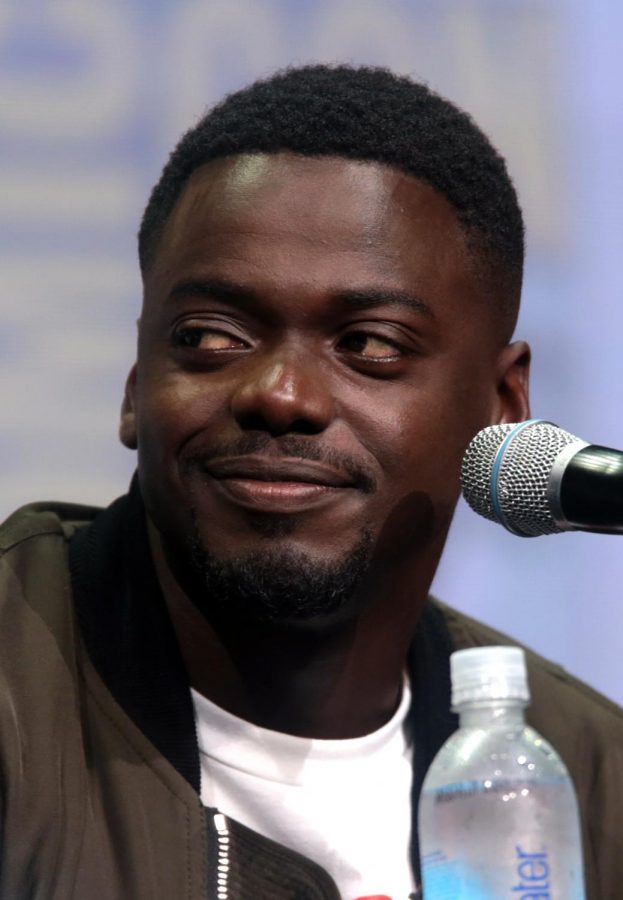‘Judas and the Black Messiah’ Is a Film to Remember
The film portrays the battle of hate and love in the 1960s United States
GAGE SKIDMORE VIA WIKIMEDIA COMMONS
Daniel Kaluuya stars in ‘Judas and the Black Messiah’ as Fred Hampton.
April 25, 2021
Warning: This article contains spoilers for the film “Judas and the Black Messiah.”
Bored of watching comedies and blockbuster films? Want to watch a film that is meaningful? Look no further — watch “Judas and the Black Messiah” (2021), a film that makes you feel something and is relevant to today’s societal issues. Get ready to grab the tissues after the credits roll and to sit in silence wondering how such a tragedy could have happened. This is a film made to evoke emotions, a rarity in today’s film industry.
“Judas and the Black Messiah” is a modern-day masterpiece thanks to its phenomenal acting performances and its stellar direction and cinematography by Shaka King and Sean Bobbitt, respectively. The effective depiction of human emotion and the racism and hatred that has plagued the United States for decades cements “Judas and the Black Messiah” in the place of the great civil rights films like “Do the Right Thing,” “Malcolm X” and “Selma.” This is a film that hits deep today, as the political corruption and racial issues of the United States have risen once again and come to light this past year.
Not everything is dark and hopeless in “Judas and the Black Messiah.” Themes of love and unity shine through the compassion and affection that the Black Panther Party shows towards its members and other marginalized groups. The film highlights the power and importance of spreading love and positivity in a time full of hate and racism.
Illinois Black Panther Party and Fred Hampton
“Judas and the Black Messiah” tells the story of the rise and fall of the Illinois Chapter of the Black Panther Party under its revolutionary leader, Chairman Fred Hampton (Daniel Kaluuya). This is a story about the battle between hate and love as the FBI and the Black Panther Party come head-to-head. The story is seen through the eyes of protagonist Bill O’Neal (LaKeith Stanfield), a man given a chance to live a “free” life. O’Neal was caught by the police for trying to impersonate an FBI agent while stealing a car. The FBI offered him a deal to infiltrate and rat out the plans and members of the Illinois Black Panther Party in return for his freedom.
Over time, this “freedom” turns out not to be what it seems. If O’Neal disobeys the FBI, he will face punishment and go to jail, taking away his bodily freedom. However, he starts to get attached to the members of the Black Panther Party like Hampton, and the film becomes a representation of O’Neal’s inner struggle. Even as he starts to believe in the Black Panther Party cause, he continues to betray the Panthers. By the end of the film, he has lost his identity and freedom of mind. The film is a tragic representation of the U.S. government preying on and using a conflicted person to end a just and beneficial cause, such as the Black Panther Party.
Bill O’Neal’s Emotional Development
Emotion is the essence of “Judas and the Black Messiah” as it undergoes a complete transformation in the way it is expressed to represent the heightening inner tension and conflict of the film’s characters. Director Shaka King’s choice to develop the emotions of characters like O’Neal is what makes this film so impactful.
In the beginning, King chose to have O’Neal hide his emotions from the other members of the Black Panther Party. We were only shown his emotions when he was alone because O’Neal didn’t associate with the Panther Party in the beginning. He was not ashamed of his actions as he happily told Roy Mitchell (Jesse Plemons), the FBI agent whom he worked with, about Hampton and the Black Panther Party’s plans and actions in exchange for money.
By the end, O’Neal displays his emotions for everyone to see as he has become personally close to members of the Black Panther Party like Hampton.
Over time, O’Neal started to become conflicted as he was turning into a believer of Hampton’s speeches. He even became an essential member of the Black Panther Party as he was awarded a security leadership position. By the end, O’Neal displays his emotions for everyone to see as he has become personally close to members of the Black Panther Party like Hampton. His internal struggle has destroyed his identity and place in society. King’s strategic methods of showing the emotions of O’Neal creates an atmosphere of relentless tension amplifying the hate and racism that dominated the time period.
What can one take away from this film? The power of selfishness, racism and love.
The FBI in ‘Judas and the Black Messiah’
O’Neal symbolizes selfishness. He continued to be an informant to the FBI even after he began to care for the Panthers. For most of the film, O’Neal took pride in giving information to Mitchell, his FBI contact. He would celebrate his rewards of fancy steak dinners and money with Mitchell. His selfishness ruled his actions for most of the film.
By the end, O’Neal realized that the Panthers were not the terrorists that the FBI portrayed them as, but an organization dedicated to the betterment of those suppressed by the racism and inequality of the U.S. government. Even with this revelation, O’Neal decided to poison Hampton in the final scene leading to his death out of fear of going to prison. Like millions of others in history, he chose himself over the betterment of the people.
You would think an FBI agent would uphold values of justice, equality, morality and dignity, but personal greed, hatred and racism prevailed even in Mitchell’s mind.
Mitchell also symbolizes selfishness, but to a greater degree, he symbolizes the power of racism. Throughout the film, Mitchell was shocked by the immoral actions and motivations of the U.S. government, specifically the FBI.
In one of the most shocking scenes, Mitchell asked FBI Agent Leslie Carlyle (Robert Longstreet) about what was going to happen to George Sams (Terayle Hill), an informant who participated in the murder of a Black Panther. Mitchell asked, “So this kid Alex Rackley was labeled an informant and then killed by an actual FBI informant, and we’re just letting him walk for murder?”
The response by Carlyle is both chilling and heartbreaking: “It’s beautiful. He’s on the lamb, right, so any time he goes into a Panther office, we get a warrant for harboring a fugitive. He’s in the interview room with our liaison guys planning the next stop on his little tour.” You would think an FBI agent would uphold values of justice, equality, morality and dignity, but personal greed, hatred and racism prevailed even in Mitchell’s mind.
Mitchell’s character also symbolizes the silent majority of white America who have allowed racism to persist even when they know it is wrong.
When J. Edgar Hoover (Martin Sheen), the influential FBI director at the time, threatened Mitchell to carry out the plan to kill Hampton, he relied on racism. He repeatedly asked Mitchell, “What would you do if your daughter came home with a Negro?” Unfortunately, Mitchell’s selfishness overtook him. He knew Hoover’s question was racist and that killing Hampton was in no way justifiable, yet he still carried out the plan. Mitchell’s job security was more important than upholding what should be the values of the U.S. government and the FBI.
Just like O’Neal, Mitchell agreed to go against his own morals and let racism and hate continue in America. Mitchell’s character also symbolizes the silent majority of white America who have allowed racism to persist even when they know it is wrong.
Love and Tragedy Combine in Fred Hampton’s Story
On a more positive note, the characters of Hampton and Deborah Johnson (Dominique Fishback) stole every scene they were in together because of their relatable and loving relationship. When Hampton was not making speeches and leading the Illinois Black Panther Party, he was a shy and caring person with Johnson. Johnson became a more outspoken and courageous member because of Hampton’s influence on her. The two truly brought out the best in each other and are a constant symbol of hope and love throughout the film.
The most tragic scene was the ending. As the police barged into Hampton’s house, they shot and murdered him while he was asleep. The camera was fixed on Johnson’s face as Hampton was murdered, an emotionally draining and tragic shot for the audience to see.
The audience can see in her face that she just lost the one person she loved the most in her life. The two unconditionally loved each other and their relationship was taken away in a matter of seconds. The scene showed how quickly someone’s life can be taken away. Most importantly, it showed what will be the legacy of this film: that people need to cherish and truly live life to the best ability they can.
If you find someone that you love, you have to let them know how much you care about them and what they mean to you because those people rarely or sometimes never come into your life again.












